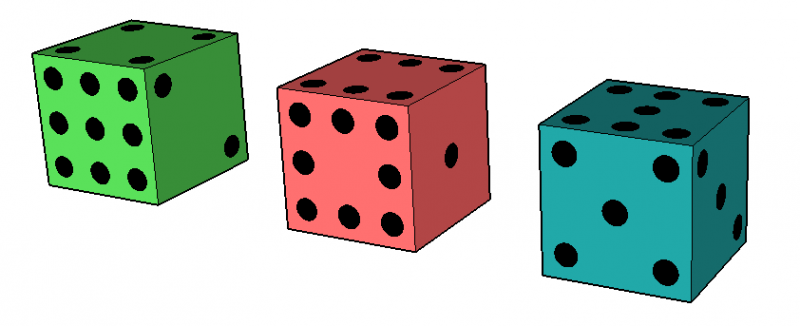Problems
Let \(s_n\) be the product of the numbers in the \(n^{\text{th}}\) row. (e.g. \(s_3=1\cdot3\cdot3\cdot1=9\)) What’s the limit \[\lim_{n\to\infty}\frac{s_{n-1}s_{n+1}}{s_n^2}?\]
Other than \(1\), does any number appear more than eight times in Pascal’s triangle?
Some randomly chosen people are in a room. A mathematician walks in and says that the probability that there exist at least two people with the same birthday is just over \(50\%\). How many people are in the room?
Imagine there’s a disease called ‘mathematitis’ which \(1\%\) of people have. Doctors create a new test to discover whether people have mathematitis. The doctors fine-tune the test until it’s \(99\%\) accurate - that is, if a person \(A\) has it, then \(99\%\) of the time the test will say that \(A\) has it, and \(1\%\) of the time the test will say that \(A\) doesn’t have mathematitis.
Additionally, for person \(B\) who doesn’t have the disease, \(99\%\) of the time the test will correctly identify that \(B\) doesn’t have it - and the other \(1\%\) of the time, the test will say that \(B\) does have mathematitis.
Suppose you don’t know whether you have mathematitis, so you go to the doctors to take this test, and the test says you’ve got it! What’s the probability that you do actually have the disease?
Imagine that people are equally likely to be born in each of the \(12\) months. How many people do you need in a room for the probability that some two are born in the same month to be more than \(50\%\)?
Some doctors make a new test for the disease ‘mathematitis’ which is even better. This new test is \(99.9\%\) accurate - meaning that \(99.9\%\) of the time when someone has the disease, the test will say so. And when someone doesn’t have the disease, \(99.9\%\) of the time the test will say that they don’t have it.
Paul goes to the doctor and test positive for mathematitis. What’s the chance he actually has mathematitis? Recall that \(1\%\) of the population has mathematitis.
Consider the following dice below:

That is, the green die on the left has sides \(2,2,4,4,9,9\), the red die in the middle has sides \(1,1,6,6,8,8\) and the blue die on the right has sides \(3,3,5,5,7,7\). In each of the dice, each side is equally likely to appear.
Imagine we both roll one die, and whoever gets the higher score wins. If I choose the green die, what die should you choose?
David and Eesa are playing a game with tossing a coin. They toss a fair coin until the first time that one of the following two sequences appears: \(HHH\) or \(THH\). If \(HHH\) appears first, then David wins. Otherwise, if \(THH\) appears first, then Eesa wins.
What are their chances of winning?
One hundred people are boarding on a fully-booked plane, and they all have assigned different individual seats. The first person has forgotten his boarding pass, so sits in a seat completely at random (that is, he’s equally like to pick any of the \(100\) seats). He might pick his own seat...but the most likely scenario is that he’ll pick someone else’s seat.
Then the second person will sit in their seat if it’s available. But if it’s taken, then they’ll sit in a random seat from those left available. Similarly the third person will sit in their seat if it’s available. But if it’s not, then they’ll sit in a random seat from those available. Each person from the second onwards to the hundredth follows these rules.
What’s the chance that the \(100^{\text{th}}\) gets to sit in their originally allocated seat?
Four mice are chosen (without replacement) from a litter, two of which are white. The probability that both white mice are chosen is twice the probability that neither is chosen. How many mice are there in the litter?